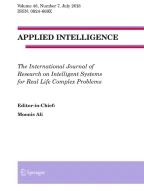Abstract
To support human functioning, ambient intelligent agents require knowledge about the tasks executed by the human. This knowledge includes design-time information like: (i) the goal of a task and (ii) the alternative ways for a human to achieve that goal, as well as run-time information such as the choices made by a human during task execution. In order to provide effective support, the agent must know exactly what steps the human is following. However, if not all steps along the path can be observed, it is possible that the agent cannot uniquely derive which path the human is following. Furthermore, in order to provide timely support, the agent must observe, reason, conclude and support within a limited period of time. To deal with these problems, this paper presents a generic focused reasoning mechanism to enable a guided selection of the path which is most likely followed by the human. This mechanism is based upon knowledge about the human and the workflow to perform the task. In order to come to such an approach, a reasoning mechanism is adopted in combination with the introduction of a new workflow representation, which is utilized to focus the reasoning process in an appropriate manner. The approach is evaluated by means of an extensive case study.
Article PDF
Similar content being viewed by others
Explore related subjects
Discover the latest articles, news and stories from top researchers in related subjects.Avoid common mistakes on your manuscript.
References
Aarts E, Harwig R, Schuurmans M (2001) Ambient intelligence. In: Denning P (ed) The invisible future. McGraw Hill, New York, pp 235–250
Aarts E, Collier R, van Loenen E, de Ruyter B (eds) (2003) Ambient intelligence. Proc of the first European symposium, EUSAI 2003. Lecture notes in computer science, vol 2875. Springer, Berlin, p 432
Bosse T, Jonker CM, van der Meij L, Treur J (2007) A language and environment for analysis of dynamics by simulation. Int J Artif Intell Tools 16:435–464
Bosse T, Both F, Gerritsen C, Hoogendoorn M, Treur J (2008) Model-based reasoning methods within an ambient intelligent agent model. In: Constructing ambient intelligence: AmI-07 workshops proceedings. CCIS, vol 11. Springer, Berlin, pp 352–370
Bosse T, Jonker CM, van der Meij L, Sharpanskykh A, Treur J (2009) Specification and verification of dynamics in agent models. Int J Coop Inf Syst 18:167–193
Ellis CA, Nutt GJ (1993) Modelling and enactment of workflow systems. In: Ajmone Marsan M (ed) Application and theory of Petri nets. Lecture notes in computer science, vol 691. Springer, Berlin, pp 1–16
Georgakopoulos D, Hornick M, Sheth A (1995) An overview of workflow management: from process modeling to workflow automation infrastructure. Distrib Parallel Databases 3:119–153
Gottschalk F, van der Aalst WMP, Jansen-Vullers MH, La Rosa M (2008) Configurable workflow models. Int J Coop Inf Syst 17(2):177–221
Jaimes A, Sebe N, Gatica-Perez D (2006) Human-centered computing: a multimedia perspective. In: Proc of the 14th ACM int conf on multimedia. ACM, New York, pp 855–864
Liao L, Fox D, Kautz H (2005) Location-based activity recognition using relational Markov networks. In: Proceedings of the nineteenth international conference on artificial intelligence, IJCAI’05
Portinale L, Torasso P, Ortalda C, Giardino A (1994) Using case-based reasoning to focus model-based diagnostic problem solving. In: Topics in case-based reasoning. LNAI, vol 839, pp 325–337
Qin X, Lee W (2004) Attack plan recognition and prediction using causal networks. In: Proc of the 20th annual conference on computer security applications, pp 370–379
Riva G, Vatalaro F, Davide F, Alcañiz M (eds) (2005) Ambient intelligence. IOS Press, Amsterdam
Rozinat A, Wynn MT, van der Aalst WMP, ter Hofstede AHM, Fidge C (2008) Workflow simulation for operational decision support using design, historic and state information. In: Dumas M, Reichert M, Shan MC (eds) International conference on business process management (BPM 2008). Lecture notes in computer science, vol 5240. Springer, Berlin, pp 196–211
van der Aalst WMP, ter Hofstede AHM, Kiepuszewski B, Barros AP (2003) Workflow patterns. Distrib Parallel Databases 14:5–51
Weiser M (1999) Some computer science issues in ubiquitous computing. Mob Comput Commun Rev 3:1559–1662
Author information
Authors and Affiliations
Corresponding author
Rights and permissions
Open Access This is an open access article distributed under the terms of the Creative Commons Attribution Noncommercial License (https://creativecommons.org/licenses/by-nc/2.0), which permits any noncommercial use, distribution, and reproduction in any medium, provided the original author(s) and source are credited.
About this article
Cite this article
Both, F., Hoogendoorn, M., van der Mee, A. et al. An intelligent agent model with awareness of workflow progress. Appl Intell 36, 498–510 (2012). https://doi.org/10.1007/s10489-010-0273-9
Published:
Issue Date:
DOI: https://doi.org/10.1007/s10489-010-0273-9
